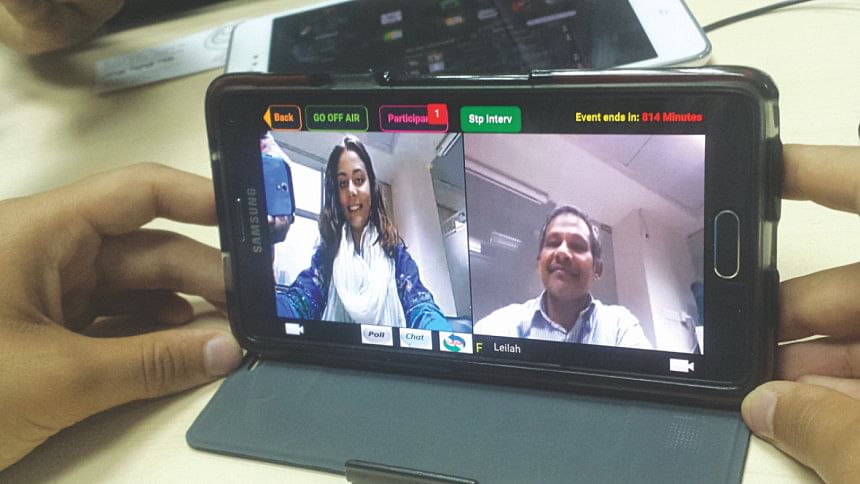Away yet not away

Bangladeshi-American engineer Shah Talukder had definite reasons to feel proud when his daughter launched a language coaching programme for poor students back in his motherland four years ago. And he had reasons to be frustrated too when Leilah, in the US, had trouble communicating with her students in Bangladesh due to hartals, weather, or traffic jams.
Shah, who excelled in innovating new businesses for a number of key American tech companies, had his own Silicon Valley way to solve this. And in the process, he created a unique fully interactive live broadcasting platform, YakSee.
Leilah and her volunteer schoolmates at Los Gatos High School in California now do not need the students to travel to their class where they have an internet-enabled computer, or worry about political shutdowns or inclement weather preventing students from going to class in Bangladesh.
"Now this is going to bring anyone from anywhere into a global interactive broadcast session using a mobile device," Shah said while talking exclusively to The Daily Star yesterday.
All they need is a smartphone or a tablet with internet. In case of poor bandwidth, the broadcast could be made either with only video or audio.
Named after the platform, YakSee, the privately-held corporation owned by Shah and based in Los Gatos, California, is going to launch the fully interactive live broadcasting service in Bangladesh today.
YakSee's ability to bring any number of participants to broadcasting makes it different from other tools like Google Hangouts, Skype, Viber or Whatsapp, said the developers.
The platform has a huge potential in citizen journalism. People should be able to broadcast live from spots and others could join in even before the crews of TV stations and news papers could reach there.
YAK AND SEE
During her first visit to Bangladesh four years ago, Leilah saw firsthand Sajida Foundation's programme to educate and support street children.
She knew she too could add more value, and along with her sister immediately arranged an English language outreach club (LOC). A group of five to six students started to meet at Sajida's Office in Dhaka every two weeks and connected to as many students in Los Gatos High School using Skype.
Seeing his daughter venting frustration whenever there was a strike or inclement weather or any other reason for the students not making make it to their classrooms, Shah thought of a platform which would allow teachers to fully participate live and interact directly with students.
Founder and general manager of leading global IT company Cisco's Safety and Security Systems Business Unit, E-SchoolNet and Zayant Inc, which was subsequently acquired by Apple, Shah conceived the idea of developing a platform that would enable Yak, which means talking profusely, and see. He formed a team of 14 volunteers who worked with him earlier at US firms.
YakSee lets anyone, anywhere, to create their own interactive live broadcast from a smartphone or tablet, and then pull members of the audience, from anywhere in the world, to participate in the broadcast. Both the broadcaster and the invited interviewee could then be seen and heard by the whole audience right from the palm of their hands.
WHY BANGLADESH
YakSee's general release will take place in a few months. But prior to that it is being made available for a controlled limited access programme in Bangladesh specifically to support, and add live interactivity, the excellent distance learning projects that the country is famous for.
"Since I am a Bangladeshi, I want to project it as a story of Bangladesh," said an excited Shah, an applied physics graduate from Dhaka University.
Some NGOs working in the field of education have already received the beta version.
WHO CAN USE IT
YakSee will be available for free download in a month or two. "But for now, it is invitation only," said Zahid Rahim, a veteran of the Silicon Valley semiconductor industry, now with YakSee business development.
Once it is installed in phones, private users on Facebook will automatically be friends on YakSee.
Groups can be formed from among them and the host can bring any of these participants live on the broadcast.
Like individuals, registered business entities could also have their own channels with YakSee.
After YouTube, this is going to be "the next big video thing", according to the developers.
Mentioning its immense growth potential due to its unique features, Rahim said, "It is going to disrupt the television broadcasting system."
Google is hosting YakSee on its cloud for free now.
Still self-funded, the developers would go for expansion of the project after securing funds. Services like recording the programmes will be incorporated later on.
Asked about its business model, Shah said besides the licensing fees, Yaksee will get a percentage of the subscriptions and adverts run on different channels.
"A person who is not a subscriber will view an advert while watching a programme on any of the channels running on YakSee," added Rahim.

 For all latest news, follow The Daily Star's Google News channel.
For all latest news, follow The Daily Star's Google News channel. 



Comments